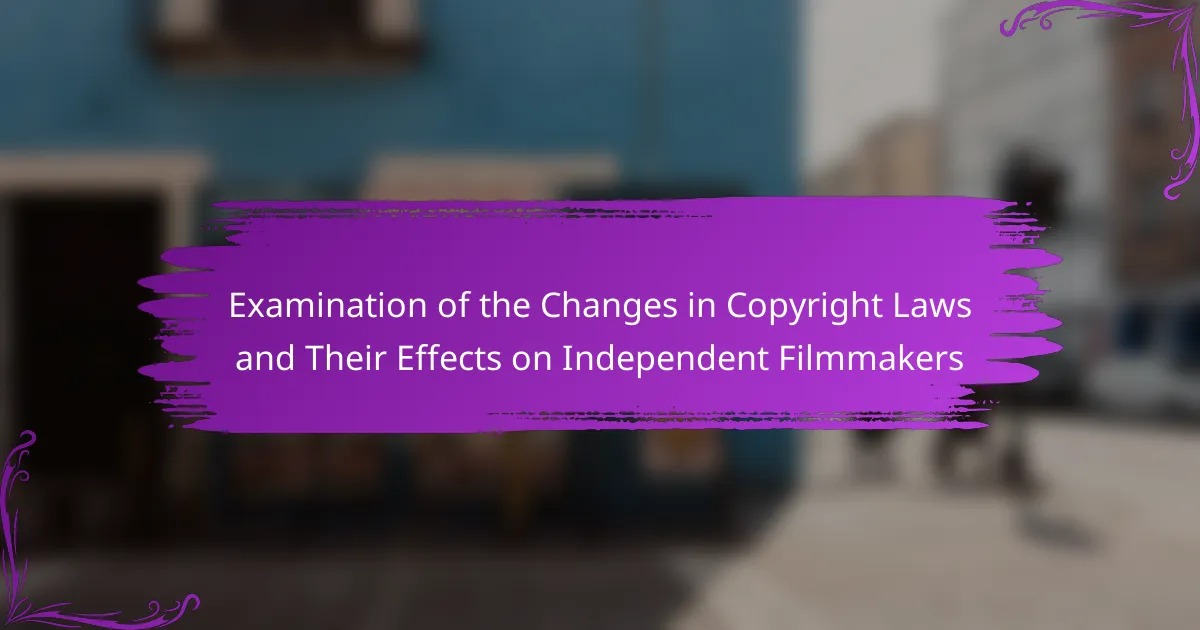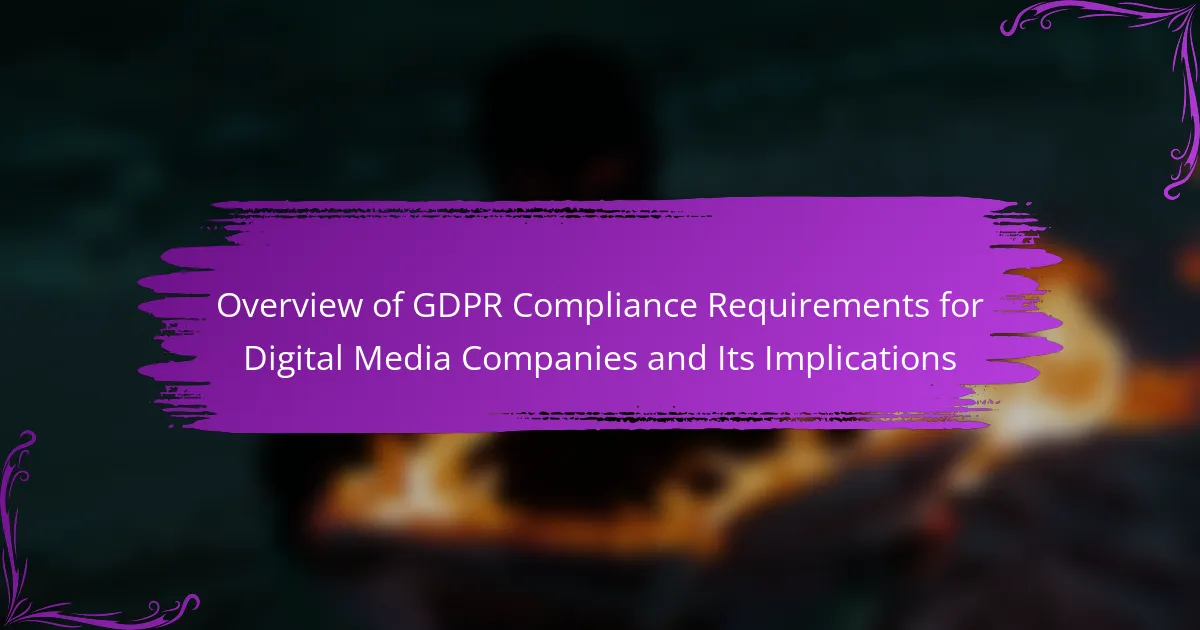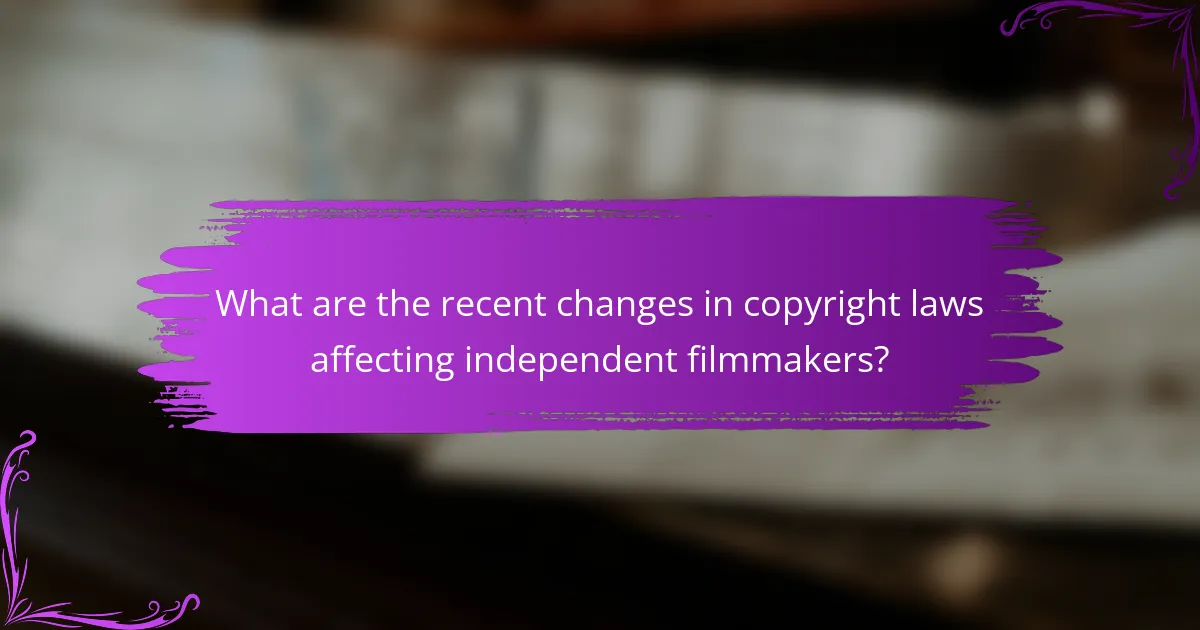
What are the recent changes in copyright laws affecting independent filmmakers?
Recent changes in copyright laws significantly impact independent filmmakers. The introduction of the Music Modernization Act has updated licensing for music use in films. This law simplifies the process of securing rights for previously released music. Additionally, the Copyright Alternative in Small-Claims Enforcement (CASE) Act allows filmmakers to pursue small copyright claims more easily. It creates a new tribunal for resolving disputes without the need for costly litigation. These changes aim to protect the creative rights of independent filmmakers and streamline their production processes. The evolving legal landscape helps ensure fair compensation and access to resources for creatives in the industry.
How have these changes been implemented in various jurisdictions?
Changes in copyright laws have been implemented differently across various jurisdictions. For example, the European Union adopted the Copyright Directive in 2019, which aims to modernize copyright rules. This directive includes provisions for fair remuneration for creators and stricter regulations on online platforms. In the United States, the Music Modernization Act of 2018 reformed licensing for music creators, ensuring better compensation. Canada has also updated its copyright laws to include provisions for digital content creators, reflecting the needs of the modern digital landscape. Each jurisdiction’s implementation reflects its unique legal framework and cultural context. These changes are designed to enhance protections for independent filmmakers and creators.
What specific aspects of copyright law have been altered?
Recent alterations in copyright law include the extension of copyright duration and the introduction of digital rights management. Copyright duration has been extended to the life of the author plus 70 years. This change affects how long works remain protected after an author’s death. Digital rights management has been introduced to combat unauthorized distribution of digital content. This technology allows creators to control access to their works online. Additionally, the fair use doctrine has been clarified, impacting how independent filmmakers can use existing works. These changes aim to balance the interests of creators with public access to creative content.
How do these alterations impact the rights of independent filmmakers?
Alterations in copyright laws significantly impact the rights of independent filmmakers. These changes can limit the ability of filmmakers to protect their original works. For instance, stricter regulations may reduce the duration of copyright protection. This can lead to increased competition from derivative works. Additionally, alterations may impose more stringent licensing requirements. Independent filmmakers often lack the resources to navigate these complexities. Consequently, their ability to monetize their creations may be hindered. Overall, these changes create challenges for the creative freedom and financial sustainability of independent filmmakers.
Why are these changes significant for the film industry?
The changes in copyright laws are significant for the film industry because they directly impact the protection of creative works. Enhanced copyright protections encourage innovation by ensuring filmmakers retain ownership of their intellectual property. This fosters a more vibrant independent film sector, allowing creators to monetize their work effectively. For instance, the Digital Millennium Copyright Act has strengthened legal frameworks against piracy. This has led to increased revenue for independent filmmakers, who previously struggled with unauthorized distribution. Furthermore, these changes help level the playing field against larger studios, promoting diversity in storytelling. Ultimately, the updates in copyright laws support a sustainable and diverse film ecosystem.
What challenges do independent filmmakers face with new copyright regulations?
Independent filmmakers face significant challenges with new copyright regulations. These regulations often increase complexity in obtaining permissions for existing works. Independent filmmakers may struggle with the costs associated with licensing copyrighted material. They also face the risk of legal repercussions from unintentional copyright infringement. Additionally, the evolving nature of copyright laws can create uncertainty in distribution rights. This uncertainty can hinder their ability to secure funding and distribution deals. A survey by the Independent Film & Television Alliance found that 60% of independent filmmakers reported difficulties navigating copyright issues. These challenges can ultimately limit their creative freedom and financial viability.
How do these changes affect the distribution of independent films?
Changes in copyright laws significantly affect the distribution of independent films. These alterations can enhance or restrict filmmakers’ ability to share their work. For instance, stronger protections may encourage distributors to take risks on independent projects. This can lead to increased visibility and access to wider audiences. Conversely, stricter copyright enforcement may limit the use of certain content, impacting creative freedom. Data from the National Endowment for the Arts shows that independent films often rely on cultural references and existing media. Therefore, changes in copyright can directly influence their marketability and distribution channels.
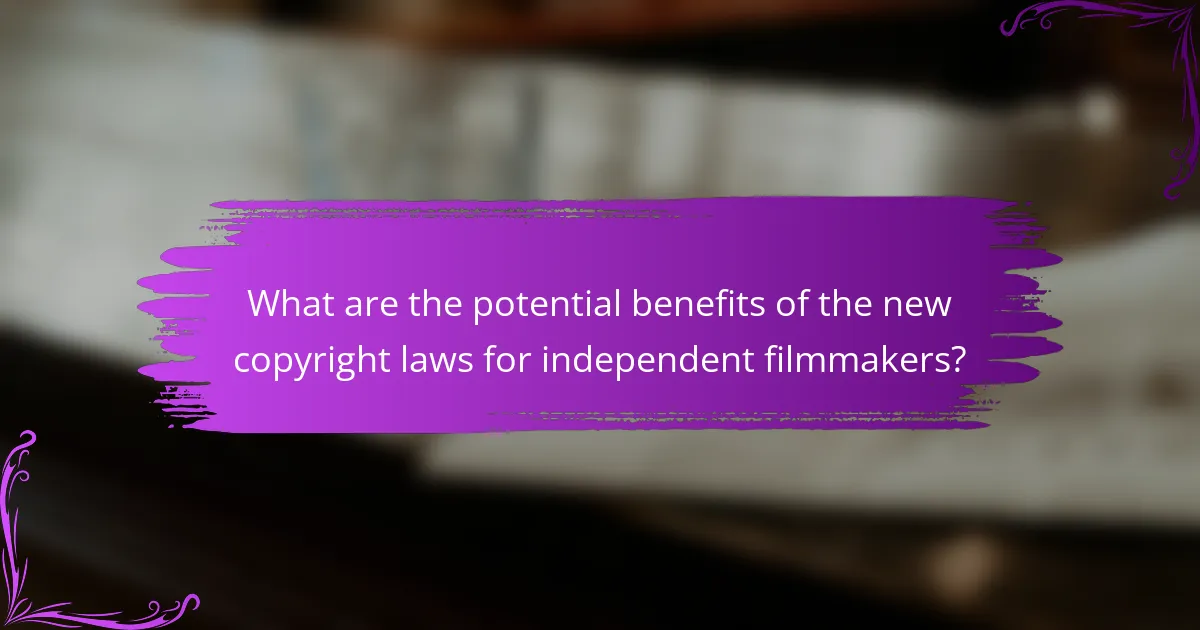
What are the potential benefits of the new copyright laws for independent filmmakers?
The new copyright laws can offer several benefits for independent filmmakers. They enhance protection for original works, reducing the risk of unauthorized use. This leads to increased revenue opportunities through licensing and distribution. Independent filmmakers can also gain more control over their intellectual property rights. Improved legal frameworks can simplify the process of enforcing these rights. Additionally, the laws may provide better access to funding and grants aimed at supporting original content. Studies indicate that stronger copyright protection correlates with increased investment in creative industries. This can foster a more vibrant independent film sector, encouraging innovation and diversity in storytelling.
How can independent filmmakers leverage these changes?
Independent filmmakers can leverage changes in copyright laws by adopting new distribution methods. These laws often allow for more flexible licensing agreements. Filmmakers can utilize platforms that support independent content. This enables wider access to audiences without traditional gatekeepers. Additionally, filmmakers can explore crowdfunding options that align with these legal changes. This can enhance financial support and audience engagement. The rise of digital streaming services has also created new revenue streams. Filmmakers can now monetize their work more effectively through these platforms. Overall, adapting to these changes can increase visibility and profitability for independent projects.
What opportunities arise from the new copyright landscape?
The new copyright landscape presents opportunities for independent filmmakers to access a wider range of creative works. This change allows for greater collaboration and inspiration from existing content. Filmmakers can now utilize more public domain materials without legal restrictions. The rise of digital platforms enables easier distribution of original content. Additionally, filmmakers can explore new revenue streams through licensing and merchandising. These opportunities can enhance visibility and audience engagement. The evolving laws also encourage innovation in storytelling techniques. Overall, the new landscape fosters a more inclusive environment for creative expression.
How can filmmakers protect their creative works more effectively?
Filmmakers can protect their creative works more effectively by registering their films with copyright offices. Copyright registration provides legal proof of ownership. This process establishes a public record of the filmmaker’s rights. Filmmakers should also use contracts for collaborators and actors to clarify ownership and usage rights. Non-disclosure agreements can safeguard sensitive information during production. Additionally, filmmakers can utilize digital watermarking to track and protect their content online. Keeping detailed production records further strengthens claims of ownership. According to the U.S. Copyright Office, registered works are eligible for statutory damages and attorney fees in case of infringement. These measures collectively enhance the legal protection of creative works.
What resources are available to help filmmakers navigate these changes?
Filmmakers can access various resources to navigate changes in copyright laws. Organizations like the Screen Actors Guild (SAG) provide guidelines and support for members. The American Film Institute (AFI) offers educational programs and workshops focused on legal aspects. Online platforms such as the Copyright Office’s website provide official information and updates on copyright laws. Additionally, legal firms specializing in entertainment law can offer personalized advice. Industry publications often feature articles discussing recent changes and their implications. Networking events and seminars can also be valuable for sharing insights among peers. These resources collectively help filmmakers stay informed and compliant with evolving copyright regulations.
What organizations provide support for independent filmmakers facing copyright issues?
Organizations that provide support for independent filmmakers facing copyright issues include the American Film Institute (AFI), the Independent Filmmaker Project (IFP), and the Writers Guild of America (WGA). The AFI offers resources and guidance on copyright matters. The IFP provides a platform for filmmakers to access legal advice and support. The WGA advocates for writers’ rights, including copyright protection. These organizations help filmmakers navigate the complexities of copyright law. They also offer educational resources and networking opportunities.
How can filmmakers educate themselves about the new copyright laws?
Filmmakers can educate themselves about new copyright laws through various resources. They should consult official government websites, such as the U.S. Copyright Office, for accurate information. Attending workshops and seminars hosted by film organizations is also beneficial. Online courses specifically focused on copyright law can provide structured learning. Joining professional associations related to filmmaking can offer access to expert advice. Reading industry publications and legal blogs helps filmmakers stay updated on changes. Networking with legal professionals in the film industry can provide personalized insights. These methods ensure filmmakers are well-informed about copyright laws impacting their work.
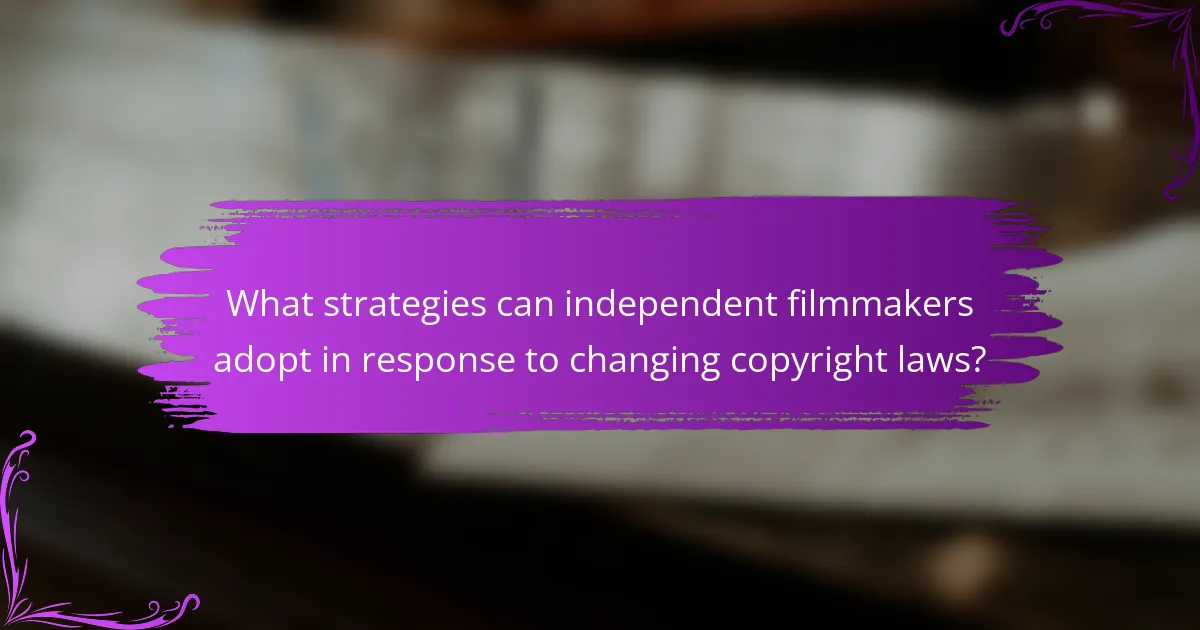
What strategies can independent filmmakers adopt in response to changing copyright laws?
Independent filmmakers can adopt several strategies in response to changing copyright laws. They should prioritize understanding the evolving legal landscape. This includes staying informed about new regulations and court rulings. Filmmakers can also seek legal counsel to navigate complex copyright issues. Collaborating with copyright experts can provide tailored advice for specific projects.
Additionally, filmmakers should consider using Creative Commons licenses. These licenses allow for more flexible sharing and distribution of their work. Filmmakers can also focus on original content creation to avoid copyright infringements. Developing strong contracts with collaborators can protect their rights and ensure clarity on ownership.
Finally, filmmakers can engage in advocacy for fair copyright policies. Joining industry groups can amplify their voices in legislative discussions. By employing these strategies, independent filmmakers can better adapt to the changing copyright environment.
How can filmmakers adapt their business models to comply with new regulations?
Filmmakers can adapt their business models to comply with new regulations by incorporating legal counsel into their planning process. This ensures they understand the implications of copyright changes. They should also invest in training for their teams on compliance issues. Adopting transparent licensing practices can help filmmakers navigate new requirements. Collaborating with legal experts can streamline the process of securing rights. Additionally, filmmakers can explore alternative funding sources that align with regulatory standards. Regularly reviewing contracts and distribution agreements is essential for compliance. These strategies are supported by industry reports indicating that proactive adaptation reduces legal risks.
What best practices should filmmakers follow to ensure compliance?
Filmmakers should establish clear agreements with all collaborators. This includes contracts that outline rights and responsibilities. They must also secure proper licenses for any copyrighted material used. This includes music, scripts, and visual assets. Filmmakers should conduct thorough research on copyright laws relevant to their location. Staying updated on changes in legislation is crucial. Regular consultations with legal experts can provide guidance. Documenting all permissions and licenses is essential for compliance. This practice protects filmmakers from potential legal disputes.
How can collaboration with legal experts benefit independent filmmakers?
Collaboration with legal experts benefits independent filmmakers by ensuring compliance with copyright laws. Legal experts provide guidance on intellectual property rights. They help filmmakers navigate contracts and licensing agreements. This reduces the risk of legal disputes. Legal advice can also enhance funding opportunities. Investors prefer projects with solid legal frameworks. Furthermore, legal experts can assist in protecting original content. This is crucial in a competitive industry. Overall, legal collaboration safeguards filmmakers’ creative and financial interests.
What common pitfalls should independent filmmakers avoid in the new copyright landscape?
Independent filmmakers should avoid using copyrighted material without permission. This includes music, footage, and images. Failure to secure rights can lead to legal disputes. Filmmakers must also be cautious about fair use claims. Misunderstanding fair use can result in copyright infringement. Additionally, neglecting to register copyrights can weaken legal protection. Without registration, filmmakers may struggle to enforce their rights. Filmmakers should also avoid relying solely on online resources for copyright information. Misinformation can lead to costly mistakes. Finally, not consulting legal experts can result in oversights. Legal advice is crucial in navigating complex copyright laws.
What mistakes have other filmmakers made regarding copyright compliance?
Filmmakers often make critical mistakes regarding copyright compliance. One common error is using copyrighted music without obtaining proper licenses. This can lead to legal action and financial penalties. Another mistake is failing to credit original creators for their work. This oversight can result in disputes and damage to professional relationships. Additionally, some filmmakers neglect to secure rights for locations or artwork featured in their films. This can cause complications during distribution. Lastly, many filmmakers assume that fair use applies broadly, which can lead to misinterpretations of the law. Understanding the nuances of copyright law is essential for avoiding these pitfalls.
How can independent filmmakers protect their intellectual property effectively?
Independent filmmakers can protect their intellectual property effectively by registering their works with the U.S. Copyright Office. This formal registration provides legal evidence of ownership. It also enables filmmakers to sue for statutory damages and attorney fees in case of infringement. Filmmakers should also consider using contracts to define rights and responsibilities with collaborators. Non-disclosure agreements can safeguard sensitive information shared during production. Additionally, filmmakers can utilize watermarking and digital rights management technologies to deter unauthorized use. Keeping meticulous records of the creation process can further strengthen claims of originality. These measures collectively enhance legal protection and reinforce a filmmaker’s rights.
What practical tips can independent filmmakers implement to thrive under new copyright laws?
Independent filmmakers can thrive under new copyright laws by understanding their rights and obligations. They should familiarize themselves with the latest copyright regulations. This knowledge helps in protecting their work from infringement. Filmmakers should also consider registering their works with copyright offices. Registration provides legal advantages in case of disputes.
Additionally, they can utilize Creative Commons licenses. These licenses allow for specified use of their films while retaining rights. Filmmakers should keep thorough documentation of their creative processes. This documentation serves as proof of ownership and originality.
Networking with legal experts can also be beneficial. Legal advice can guide filmmakers in navigating complex copyright issues. Finally, staying informed about changes in copyright laws is crucial. Regular updates ensure filmmakers adapt their strategies effectively.
The main entity of this article is copyright laws and their impact on independent filmmakers. The article examines recent changes in copyright legislation, including the Music Modernization Act and the CASE Act, which aim to simplify licensing and enhance protections for creators. It discusses the implementation of these changes across various jurisdictions, the specific alterations made to copyright regulations, and the resulting challenges and opportunities for independent filmmakers. Additionally, the article outlines strategies for filmmakers to navigate the evolving legal landscape, protect their intellectual property, and adapt their business models in response to new copyright laws.
